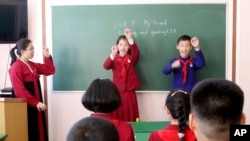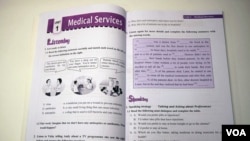In contrast to the open hostility toward the United States, North Korea has been doubling down on English education in its public schools under the leadership of Kim Jong Un, according to North Korea internal documents, textbooks and other educational materials reviewed by VOA’s Korean Service.
North Korea is typically wary of American influence flowing into the country, warning its citizens against “a rotten Yankee culture.” The isolated country’s state-run media, however, is touting the value of English language education.
North Korea’s Korean Central Broadcasting Television last month aired clips of interviews with North Korean teachers, stressing the importance of English education.
“Respected Comrade Kim Jong Un has told us in particular about strengthening education in computer technology and foreign language,” Ahn Sung Ae, principal of Pyongyang’s Sangshin Middle School, said in one of the clips. “In the education contents, including the foreign language, we are encouraged to teach the students in a more practical manner.”
The state-run television network also ran footage of a new “English learning room” for students at public schools.
Under the leadership of Kim Jong Un, North Korea has increased its hostility toward the United States and escalated tensions with a series of weapons tests, violating multiple U.N. Security Council resolutions.
In June, North Korea tested a multiple-warhead missile, which is intended to strike multiple targets in the United States.
Kim, who came to power in late 2011, overhauled the country’s education system by increasing the duration of compulsory schooling from 11 years to 12 years, starting in 2013.
North Korea’s four-year elementary school system converted to a five-year system, allowing children to begin learning English at an earlier age.
“I began to learn English when I was in the middle school. Later, there was some debate over the effectiveness of the early learning in English,” Ye Eun Lee, who defected from North Korea in 2019 when she was 19, told VOA’s Korean Service.
“And they changed the policy and started to teach English in elementary schools.”
The 12-year Compulsory Education Code, reviewed by VOA’s Korean Service, stated that English language education should be strengthened "in order to widely adopt the advanced global technologies, and develop international exchanges and cooperation in the field of science and culture.”
The code, published in 2013 by North Korea's Education Commission, underscored that the purpose of learning English is to actually use the language in real life, requiring students to put more effort in practice.
North Korean defector Lee Chul, a graduate of Kim Il Sung University in Pyongyang and now a Peace Foundation fellow in South Korea, told VOA’s Korean Service that students tend to practice speaking and listening among themselves.
“There’s no other way, since it is difficult to find native English speakers in North Korea,” he said.
In the Kim Jong Un era, English has become an essential means to benefit from developments in global business and technology.
Lee Hyun Seung, a North Korean escapee and former chair of the Kim Il Sung Socialist Youth League branch in Dalian, China, told VOA’s Korean Service that one of the reasons behind Kim Jong Un’s push for the English use was linked to the advancement of technology.
“You need to know English to learn about information technology,” said Hyung Seung, who now lives in the United States.
Accordingly, North Korea’s English language education has increasingly focused on enhancing pragmatic skills.
A comparative analysis by VOA’s Korean Service of North Korean English textbooks and other educational materials produced before and after the 2013 education reform confirms this trend.
A newer textbook, published in July 2015 for 12th graders enrolled in specialized high schools for advanced students, prioritizes listening and speaking, rather than perfecting grammar.
The foreword of the 2015 book makes clear it was developed in accordance with Kim Jong Un's directives to emphasize the acquisition of practical English.
The book was “designed to enable students to learn four skills of listening, speaking, reading, and writing in English at a higher level and to focus on issues related to daily life and science and technology,” according to its foreword.
Meanwhile, English-education materials for the third and fourth grade students were designed to accommodate younger learners, with texts accompanied by many illustrations.
According to the materials, the elementary students were also taught how to type alphabets on the keyboards, suggesting there are needs for the young students to write in English on the computer.
These materials reviewed by VOA’s Korean Service were saved on a tablet computer, branded as Ryonghung. The product was first released in 2013 and advertised as based on North Korea’s homegrown technologies, according to South Korea’s Yonhap News Agency.
Lee Chul said that proficiency in English helps North Korean people get better jobs, especially giving them opportunities to work overseas.
“In South Korea, anyone can go abroad. North Korean people can go abroad only when they work for diplomatic missions overseas. So, English is important for the students who want to earn more money,” he said.
Lee Hyun Seung agreed, saying being fluent in English helps job seekers land on managerial roles.
“There are two engineers. And if one of them speaks English, he will be put in a higher position,” he said.
He added that those who could understand English were considered “cultured” among North Korean people, especially when unprecedented summits were taking place between the North Korean leader and former U.S. President Donald Trump from 2018 to 2019.



